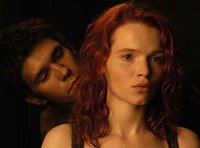
Perfume: The Story of a Murderer (Tom Tykwer, 2006)
Whatever I may go on to say in this review, I cannot say the one thing you might be expecting: that I'd recommend you didn't see Perfume: The Story of a Murderer. Perfume is a highly flawed film, yes, a disappointing one, a distressing one, but it's also a fascinating one, and I would insist that you form your own opinions. Granted, this is an idea that should really be active with any film, which in effect makes the writing of reviews redundant if their sole purpose is to advise people on what to see. But Perfume is not a generic film, it is not one that can be described passively in one word, and you have certainly not seen it all before.
You might have seen bits, however, and it's when Perfume suddenly runs into familiar story-telling territory that the disasters commence. The first hour and a half or so of the film is really quite gripping; never perfect but always dextrously playing with its audience, guiding them through a world that it both dark and campy at the same time, a world that always totters on the border it creates between the two opposites. Before any images have even appeared there is a voice, and this voice is immediately recognisable to any viewer, whether positive or negative, of Lars Von Trier's incisive Dogville, for that voice is John Hurt's. This is, unsurprisingly, a problem for Perfume, because Hurt's voice, while a perfect match for the skewered artificiality of Trier's work, doesn't fit a more straight-forward atmosphere, which is what Perfume is clearly aiming for. I'm not sure whether director Tom Tykwer realises this or not, but Hurt's voice, after the opening, is rarely heard again- all the better to slide into Perfume's grimy world.
Jean-Baptiste Grenouille (played for most of the film by Ben Whishaw) is born, repulsively, under a fishmonger's table, where his mother, having experienced several stillbirths, leaves the slimed baby to die under the table, meaning, of course, that she's executed when the baby suddenly starts crying under her table, lying as it is in a pile of fish remains. Immediatly the main theme, and raison-de-etre, even, of Perfume is established. Patrick Suskind's infamous novel was branded unfilmable by the reclusive author himself, and for twenty years he refused to sell the rights to his novel, despite the apparent interest of filmmakers including Stanley Kubrick, Tim Burton and Martin Scorsese. Suskind insisted that because his novel is concerned so fully with smell, it would not translate to film- and he had a valid point, because not yet has smell-o-vision been invented. Tykwer does just about the only thing he can and uses film's unique senses- vision and hearing- to create the most vivid impression he can on his audience, willing them to conjure the aromas themselves. He achieves this well in the first part of the film but as his story stumbles, so does he, repeating motifs uselessly and letting the plot run away with the camera.
Perfume is fine while it takes the audience into places they haven't really been before- a newborn baby on a heap of stinking fish, the untrained youngster recreating a difficult perfume perfectly before a master perfumier's eyes, a house on a bridge suddenly collapsing- but when the character of Grenouille moves it literally shifts the film, and in more ways than one. Grenouille, rather unsubtley, leaves a trail of death behind him even before he becomes the murderer of the title, as all the carers and guardians, good or bad, whom he leaves behind immediately die. What is this device suggesting exactly? That Grenouille was a murderer even before he actually killed someone? That his murdering ways are inevitable? Anyway, once Grenouille, having followed the apparently heavenly scent of a young girl selling plums (a haunting Karoline Herfurth), accidentally suffocates her and loses her scent, he becomes obsessed with capturing scent, social conscious and morality flying to the wind as he takes women and experiments with capturing their scent, becoming a feared murderer in the town of Grasse, to where he has followed Laura (Rachel Hurd-Wood), remarkably similar to his first victim in both look and, it seems, scent.
Perfume's problems, do, as I've mentioned, begin at this point, though to begin with they are simple difficulties, that of suddenly becoming a distressingly conventional serial killer hunt. These problems were not perplexing but saddening, but Perfume does not stay long on this track, instead diverting itself to something bizarrely different. To discuss Perfume's end would be to give it away, so I will say simply that it is one of the most unexpected, bizarre and entirely ludicrous conclusions to a film that I've ever witnessed- and yet it is not unpraisable. I have not read the novel, and so cannot comment on whether this ending worked well on the page, but while left me feeling baffled, perplexed and rather annoyed, I cannot claim to say that I, as yet, entirely understand what this ending meant. I think that even if it's message is more complex than I can give it credit for, however, Tykwer still muddles it, a strong vein of mysogyny and homophobia gleaming through it.
Perfume is not a good film, although it has many strong qualities- the photography is inch-perfect, working with the closeness of the image to highlight all the pores and hairs of the skin, maximising the idea of scent as best it can, while the music works well, and the performance of Whishaw is excellent- to balance with it's problematic negativities. I cannot say that I would encourage you to see it, but if you have any interest, go, and see what you think. You never know, you may come away from it thinking it smells of roses. Grade: C

No comments:
Post a Comment